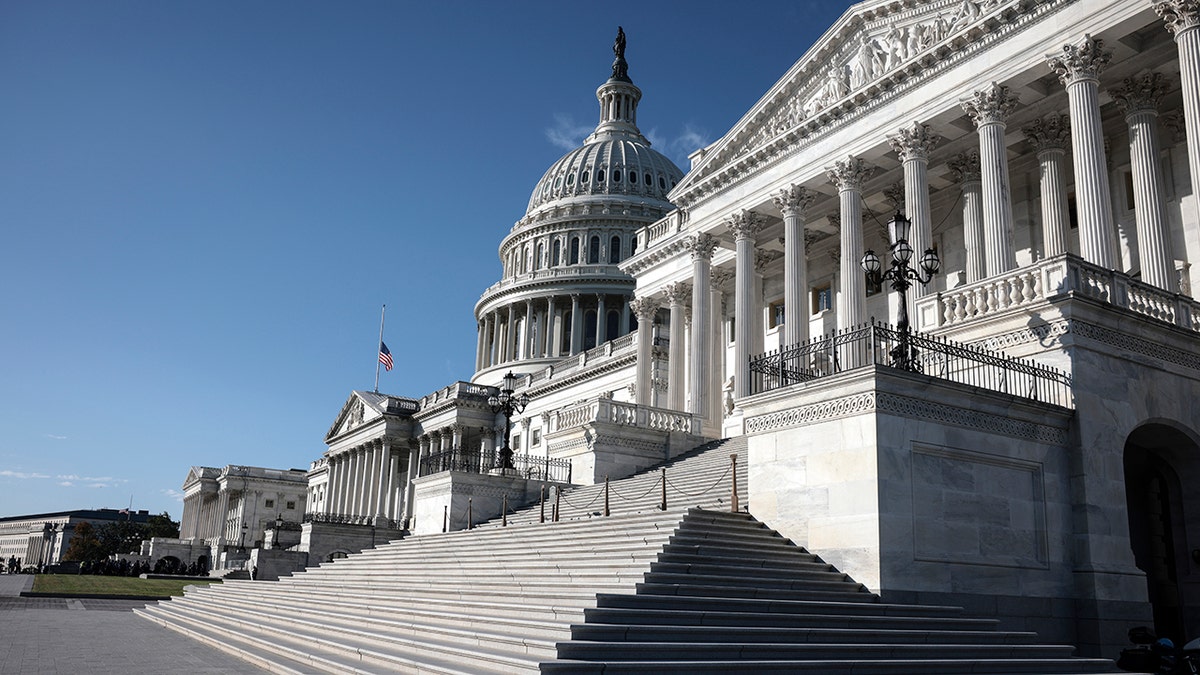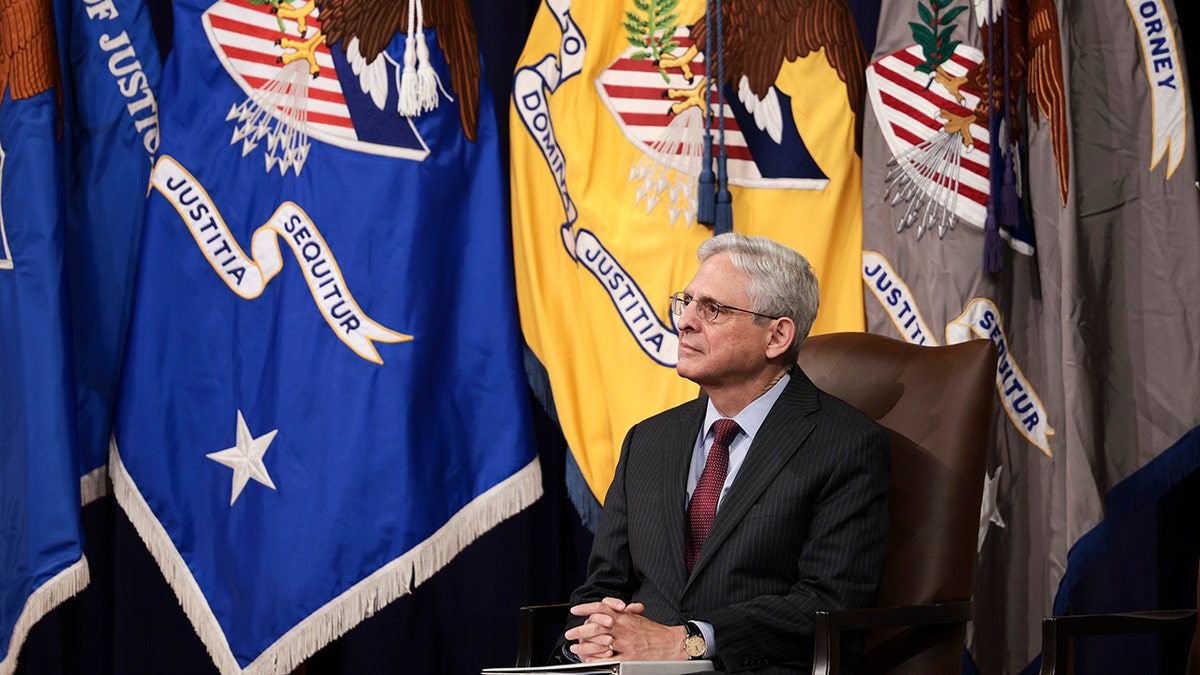Fox News Flash top headlines for October 26
Fox News Flash top headlines are here. Check out what's clicking on Foxnews.com.
When it comes to subpoenas and "contempt of Congress," Capitol Hill is kind of like a gym.
Congress has these kettlebells the size of an engine block. Stacks of 45-pound plates. Rows of 100-pound barbells. There are thick, military-grade lifting belts, and there’s chalk sprinkled all over the floor.
Walk around the Capitol Hill subpoena gym, and the members flex and pose like Jack LaLanne working out at Muscle Beach by the Santa Monica Pier. Their muscles pop and bulge like Popeye’s forearms just after downing a can of spinach.

The U.S. Capitol Building is seen on Oct. 22 in Washington, D.C. (Anna Moneymaker/Getty Images, File)
And then when it comes to lawmakers actually enforcing their subpoenas, you find that these bulging congressional biceps are just a façade. The preening reveals that lawmakers’ muscle is a result of political anabolic steroids.
Congressional brawn is deceptive. Lawmakers don’t have the clout you thought they did when it comes to subpoenas and contempt of Congress.
The House voted to find former White House adviser Steve Bannon in contempt of Congress and send the referral to the Justice Department for prosecution recently. Democrats were more than happy to pile on to their nemesis.
"(Bannon) has clearly thumbed his nose at the legislative process," said House Jan. 6 Committee Chairman Bennie Thompson, D-Miss., who pushed the contempt of Congress resolution. "We clearly have the authority for oversight and investigation. So it’s vested in the legislative branch of government and we plan to exercise that right."
"Mr. Bannon is using privilege as a pretext for not appearing at all and for producing absolutely no documents of any kind," said Jan. 6 Committee Vice Chair Liz Cheney, R-Wyo. "That puts this institution's authority at significant risk, not just here and now, but in all future investigations. Criminal contempt is the appropriate response in these circumstances."
It’s ultimately up to the Justice Department to decide whether or not to prosecute the case. A conviction could result in jail time.

Steve Bannon, former Trump political strategist, leaving federal court in New York on in Aug. 2020. Recently, the House held Bannon in contempt of Congress. (Mark Kauzlarich/Bloomberg via Getty Images, File)
The committee did not forge ahead with similar contempt resolutions for other Trump-era figures like former White House chief of staff Mark Meadows. That’s because he’s said to be cooperating in good faith with the committee about coming to an agreement on the information lawmakers desire. But Bannon put up an absolute roadblock, saying he wouldn’t comply with a subpoena as part of its inquiry into the Capitol riot. Bannon also invoked an executive privilege shield – even though he only served in the Trump administration for a brief period of time and was long gone by the time the January riot hit.
"If it’s an executive branch person, or, in theory, a former aide, Presidents have ways to claim privileges to stop the process from going forward," said Sarah Binder of the Brookings Institution. "It can take months if not years to play out, long after a party has lost control."
The House voted to send the contempt of Congress resolution to the Justice Department for criminal prosecution.
In other words, this is a proxy fight. Congress can’t do its own dirty work when it comes to contempt of Congress to enforce a subpoena. They must foist this responsibility onto the executive branch to enforce it.
"What we do have now is an administration that we believe will listen to the process," said Thompson.

Attorney General Merrick Garland at a Justice Department event. ( Anna Moneymaker/Getty Images, File)
Attorney General Merrick Garland was far from committal about taking Bannon to court when pressed by Rep. Eric Swalwell, D-Calif., at a recent House Judiciary Committee hearing.
"If the House of Representatives votes to refer a criminal contempt matter to the department, we will review and act according to the law and the facts as the principles of the prosecution require," replied Garland to Swalwell.
Granted, a Democratic administration probably looks a little more favorably on a contempt of Congress resolution for Steve Bannon compared to ones sent over by House Republicans during President Obama’s administration.
In 2014, the House voted to hold former IRS figure Lois Lerner in contempt of Congress over refusing to testify. The House held former Attorney General Eric Holder in contempt of Congress in 2012.
It was pretty clear that Holder wasn’t going to have his own DOJ probe himself on what many Democrats viewed as a specious charge by House Republicans.
During the administration of President George W. Bush, a Democratic House voted to hold then White House chief of staff Josh Bolten and White House Counsel Harriet Miers in contempt of Congress in 2007 over the firing of U.S. attorneys. House Republicans stormed off the floor in protest at the end of the roll call vote.
The issue wound its way through the courts. The courts eventually threw up their hands, deeming the fight a political matter.
In other words, the legislative branch was in a dispute with the executive branch and wanted the judicial branch to figure things out.
No wonder contempt of Congress is so unenforceable.
By the way, the House finally worked out a deal to hear from Miers and former Bush aide Karl Rove – but in early 2009 – months after the end of the Bush administration.
Ironically, even a successful prosecution wouldn’t necessarily yield the information the committee wants.
However, there may be a way for Congress to truly bring a little more muscle to subpoenas.
It’s a concept known as "inherent contempt." This is where Congress, as an institution, actually deploys its "inherent" powers to arrest and hold an uncooperative person. Theoretically, the House or Senate could dispatch the Sergeant at Arms to arrest that subject.
House Speaker Nancy Pelosi, D-Calif., suggested in 2019 that the Capitol had a "jail" in the basement where the House could hold members of the Trump administration who lawmakers voted to hold in contempt. What Pelosi is referring to is a tiny, subterranean alcove which looks like a jail. It’s the crypt where they originally planned to bury George Washington. Washington is buried at Mount Vernon. So, the old Washington "crypt" is simply blocked off with a foreboding, wrought iron gate and secured by a padlock.
Fox investigated whether Congress ever held anyone it "arrested" in that space. There is no record of any such Capitol incarceration.
"There doesn’t seem to be a lot of stomach in Congress for actually trying to send out the Sergeant at Arms to arrest Bannon, bring him to the House and throw him in jail," said Binder. "Where would you throw him?"
That said, Congress used to periodically enforce its own version of contempt in the late 18th and 19th centuries. Newspaper publishers and editors were frequent targets of the incipient Congress.
Lawmakers haven’t relied on inherent contempt since 1934. That’s when lawmakers voted to hold Assistant Secretary of Commerce William McCracken in contempt of Congress. McCracken wasn’t cooperating with a probe into a scandal involving air mail. Congress didn’t hold McCracken at the Capitol – but at the Willard Hotel in downtown Washington.
That’s ironic because Democrats now have questions for Bannon and Trump associates about whether they used the Willard as an operations center ahead of the January riot.
"You can’t blow off the United States Congress from your sofa and think you’re going to get away with it," said Rep. Jamie Raskin, D-Md., of Bannon’s defiance. "Congressional subpoenas are very tough medicine."
Not really.
Unless lawmakers eventually go the route of inherent contempt.
But, there are problems there, too. Inherent contempt could trigger separation of powers issues.
CLICK HERE TO GET THE FOX NEWS APP
"Past episodes suggest that there’s really, very little teeth if you want to contest what Congress is trying to do," said Binder.
But when it comes to subpoenas, lawmakers will flex their muscles and show their fangs – even if there’s not much clout to back that up.














































